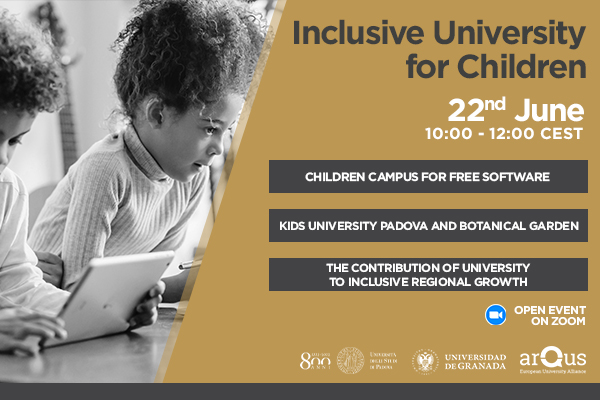On 22nd June, from 10 am to 12 pm CEST, the Arqus Alliance holds the webinar “Inclusive University for Children”, which will consist of three sessions devoted to different topics related to children and inclusiveness.
Session 1:
Children campus for free software, by Pablo García Sánchez (Head of the free software office at the University of Granada).
The general objective pursued in the Free Software Children’s Campus is to introduce schoolchildren to the knowledge and use of ICT tools of free software and hardware, linking them with science, culture and open knowledge as well as with the communities of growth.
To achieve this general objective, different specific objectives are worked on:
- Objective 1: Awaken scientific curiosity in schoolchildren, practice cooperative and collaborative work and use of new technologies through free software.
- Objective 2: Awaken in schoolchildren the scientific, cultural and knowledge spirit as common goods of society.
- Objective 3: Promote the use of free software from an early age. To achieve this objective, the tools used on the Campus will all be free.
- Objective 4: Enhance the skills of schoolchildren in the use of new technologies through free software.
- Objective 5: Promote the initiatives of girls participating in the Campus, giving them support from free software.
Session 2:
Kids University Padova and Botanical Garden, by Elisabetta Menegatti (Communication office) and Agnese Comellato (Events office – Botanical Garden & Villa Parco Bolasco)
Primarily, the aim of the event is to host children in various departments of our University where they can experience science and moreover they can encounter researchers face to face. All the phases of collection of the educational offer, promotion, development, relationship with schools and families, final ceremony are explained, giving a particular focus on the activities carried out at the Botanical Garden. The University of Padua Botanical Garden is the oldest botanical garden in the world and since 1997 it has been a UNESCO World Heritage Site. Visited by more than 180.000 people every year, it offers many activities for families and schools coming from all over Italy.
Session 3:
The Contribution of University to Inclusive Regional Growth, by Renata Bilbokaite (Head of Vilnius University Siauliai Academy)
The impact of higher education on the region should mostly manifest through the formation of human capital, education, qualification and assurance of conditions for lifelong learning. Moreover, the contribution of universities should be visible in the processes of creation, implementation of knowledge and innovations in the region, while closely collaborating with business. STEAM could help to assure real inclusion of various children, teenagers and young adults working together in interdisciplinary teams solving scientific problems in a creative way.
The presence of a higher education institution and STEAM professional activities for children and students in the region should be beneficial for the generation of ideas that are used for the initiation and development of business in the future, thus contributing to economic development. While implementing R&D activities, the region is gradually becoming more competitive among other regions, capable to faster meet the tendencies of global evolution, becomes integrally and socially sustainable. The whole activity of higher education and STEAM education for children and students should make an essential impact on regional development, which would decrease emigration, increase international advantage, create a high added value and cultural socio-economic welfare.
Connect on 22nd June at 10 am CEST through this link.

